Introduction
In the rapidly evolving landscape of technology, the integration of DevOps practices with cloud solutions has emerged as a game-changer for organizations striving for efficiency and agility. This article delves into the core principles and essential tools that underpin the DevOps movement, highlighting its profound impact on software development and IT operations. By fostering collaboration and leveraging automation, businesses can significantly enhance deployment frequency and product quality.
However, the journey towards successful implementation is not without its challenges, from cultural resistance to skill gaps and integration complexities. As companies navigate these hurdles, the strategic adoption of cloud-based DevOps services offers a pathway to scalability, cost efficiency, and improved security, positioning them to thrive in a competitive market.
Through a comprehensive exploration of key practices and the benefits they bring, this article provides valuable insights for organizations looking to optimize their cloud and DevOps strategies.
Understanding DevOps: Core Principles and Practices
This approach represents a pivotal cultural and technical movement that prioritizes collaboration between software development (Dev) and IT operations (Ops). At the heart of this practice lies a commitment to fostering a collaborative environment, embracing continuous feedback, and leveraging automation. Essential practices such as continuous integration (CI), continuous delivery (CD), and infrastructure as code (IAC) are fundamental to this approach.
Organizations that effectively implement these principles experience significant improvements in deployment frequency and product quality, with data indicating that teams utilizing these methodologies can resolve issues 96 times faster than their counterparts who do not. A notable trend is the unification of security with observability and monitoring; 72% of respondents are actively working towards this integration to address dynamic security threats, reflecting a proactive approach within DevOps practices. Furthermore, by integrating these principles within cloud environments, businesses can capitalize on the scalability and flexibility of cloud and DevOps services.
This not only enhances operational resilience but also leads to more efficient workflows, positioning entities to meet the demands of a rapidly evolving technological landscape. As Kubernetes and container use continue to rise, entities are increasingly pursuing a cloud-native strategy, which becomes essential for maintaining competitive advantage in IT operations. With the software development and operations market projected to grow at a compound annual growth rate of 18.95%, reaching USD 12,215.54 million by 2026, the importance of adopting these practices cannot be overstated.
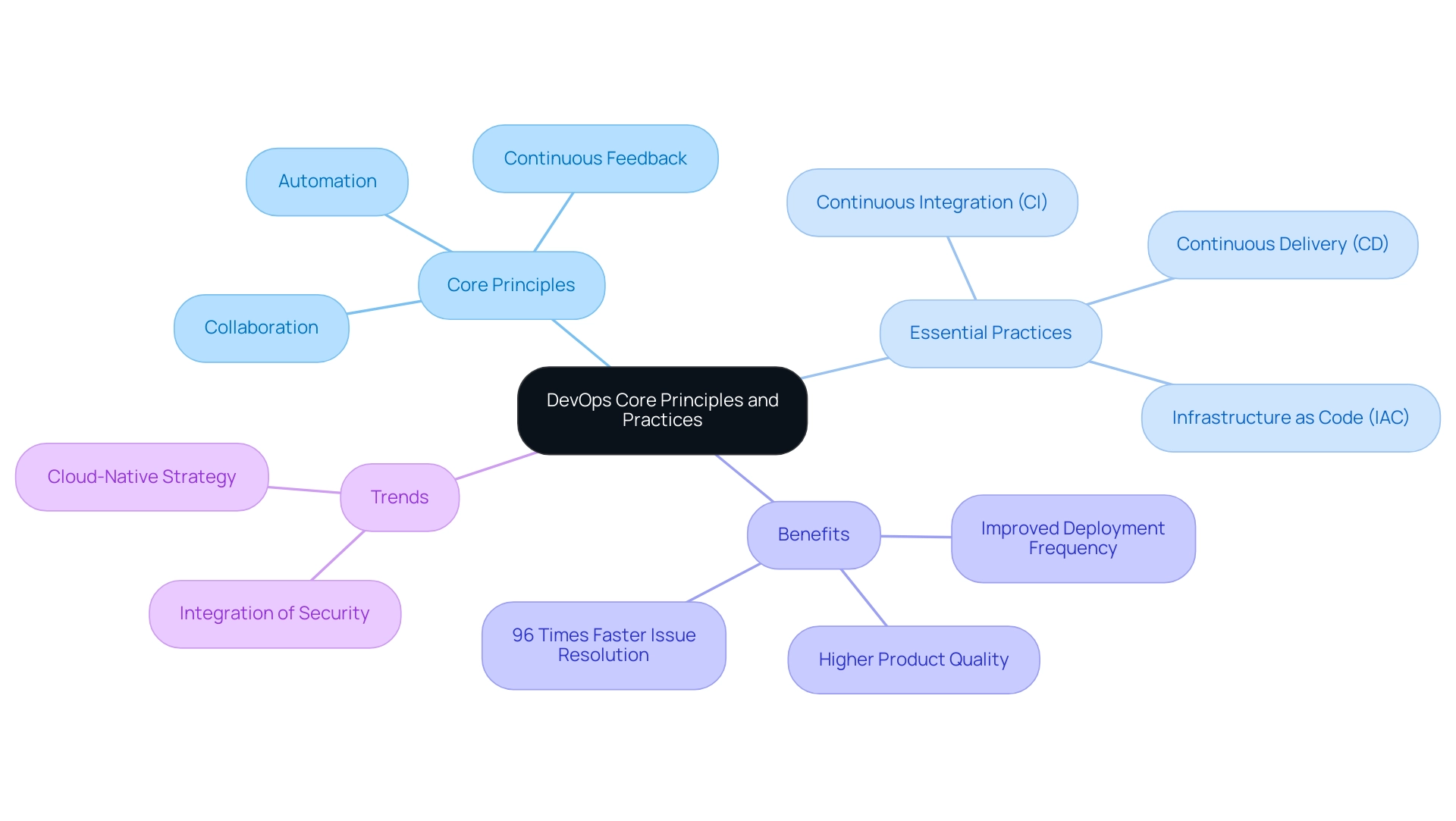
Key Practices for Optimizing Cloud and DevOps Performance
To attain optimal performance in virtual and development operations settings, entities must embrace several key practices:
- Continuous Integration and Delivery (CI/CD): Automating the integration of code alterations and application deployment significantly reduces manual errors and accelerates release cycles. Recent surveys indicate that over half of IT teams now leverage CI/CD practices to streamline their workflows, with more than half of teams surveyed using practices primarily for deploying containers, reflecting a strong trend towards containerization.
- Infrastructure as Code (IaC): Utilizing IaC tools such as Terraform and AWS CloudFormation empowers teams to manage and provision infrastructure through code, ensuring consistency and repeatability across environments. The shift towards IaC has proven beneficial, with many organizations reporting enhanced cloud and DevOps services, leading to improved cloud performance and reduced configuration drift. This approach is vital as 6.8% of companies that use DevOps are from India, showcasing the global adoption of these practices.
- Monitoring and Logging: Tools like Prometheus and the ELK Stack play a vital role in continuously tracking application performance and user experience. This proactive approach to monitoring allows groups to swiftly identify and resolve issues, improving overall service reliability.
- Collaboration and Communication: Establishing a culture of collaboration using platforms such as Slack and Jira fosters alignment and transparency among groups. This guarantees that all stakeholders are aware and involved during the development process, which is vital for effective CI/CD execution.
As entities maneuver through the intricacies of contemporary IT operations, these best practices not only boost efficiency but also aid in better cost management—an essential factor for advanced IT teams today leveraging cloud and DevOps services. The case study titled 'Deployment Targets for Development Operations Teams' highlights this trend, demonstrating the effectiveness of adopting these practices in real-world scenarios.
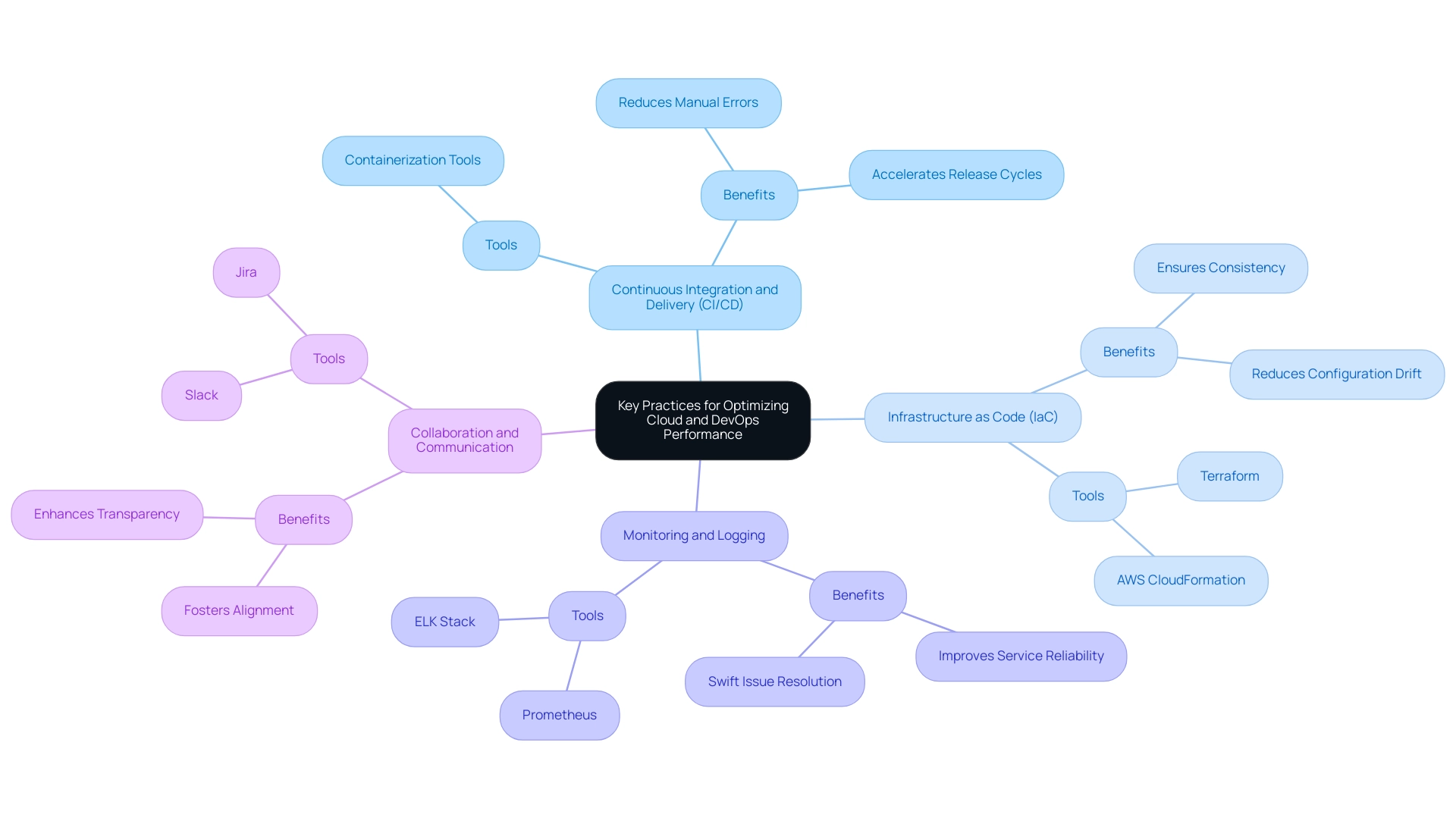
Essential Tools for Effective Cloud and DevOps Integration
For organizations aiming to effectively integrate cloud solutions with DevOps practices, leveraging key tools is essential:
-
Git: Serving as a foundational version control system, Git enables collaborative coding and meticulous tracking of changes, making it indispensable for Continuous Integration (CI) and Continuous Deployment (CD) processes. With recent studies indicating that over 70% of software development groups rely on Git, its significance in modern workflows cannot be overstated. However, it is important to note that GitHub Actions, while useful, can be limited by potentially expensive pricing for large-scale usage and its exclusivity to GitHub as a version control system.
-
Jenkins: As a leading automation server, Jenkins supports robust CI/CD pipelines, facilitating seamless integration and delivery of applications. Its extensive plugin ecosystem allows for customization, ensuring that teams can tailor their workflows to specific project requirements. Additionally, Appvance provides validations with 90% less effort, highlighting the efficiency of tools like Jenkins in streamlining processes.
-
Kubernetes: This orchestration tool is vital for automating the deployment, scaling, and management of containerized applications, significantly enhancing operational efficiency. By streamlining these processes, Kubernetes allows organizations to respond swiftly to changing demands and maintain high availability.
-
Docker: By providing a containerization platform, Docker empowers developers to package applications along with all dependencies, ensuring consistency across various environments. This capability not only simplifies deployment but also mitigates the risks associated with configuration mismatches.
-
Ansible: This powerful configuration management tool simplifies the automation of infrastructure and application deployments. By reducing manual effort, Ansible enables teams to focus on higher-value tasks, resulting in increased productivity and reduced time to market.
Integrating these tools into IT operations enables organizations to attain a more agile and efficient development lifecycle, optimizing their cloud and operational strategies. As Rajakumar N. observes, upon completion, students obtain a certification that confirms their proficiency in the field, making them highly competitive in the job market.
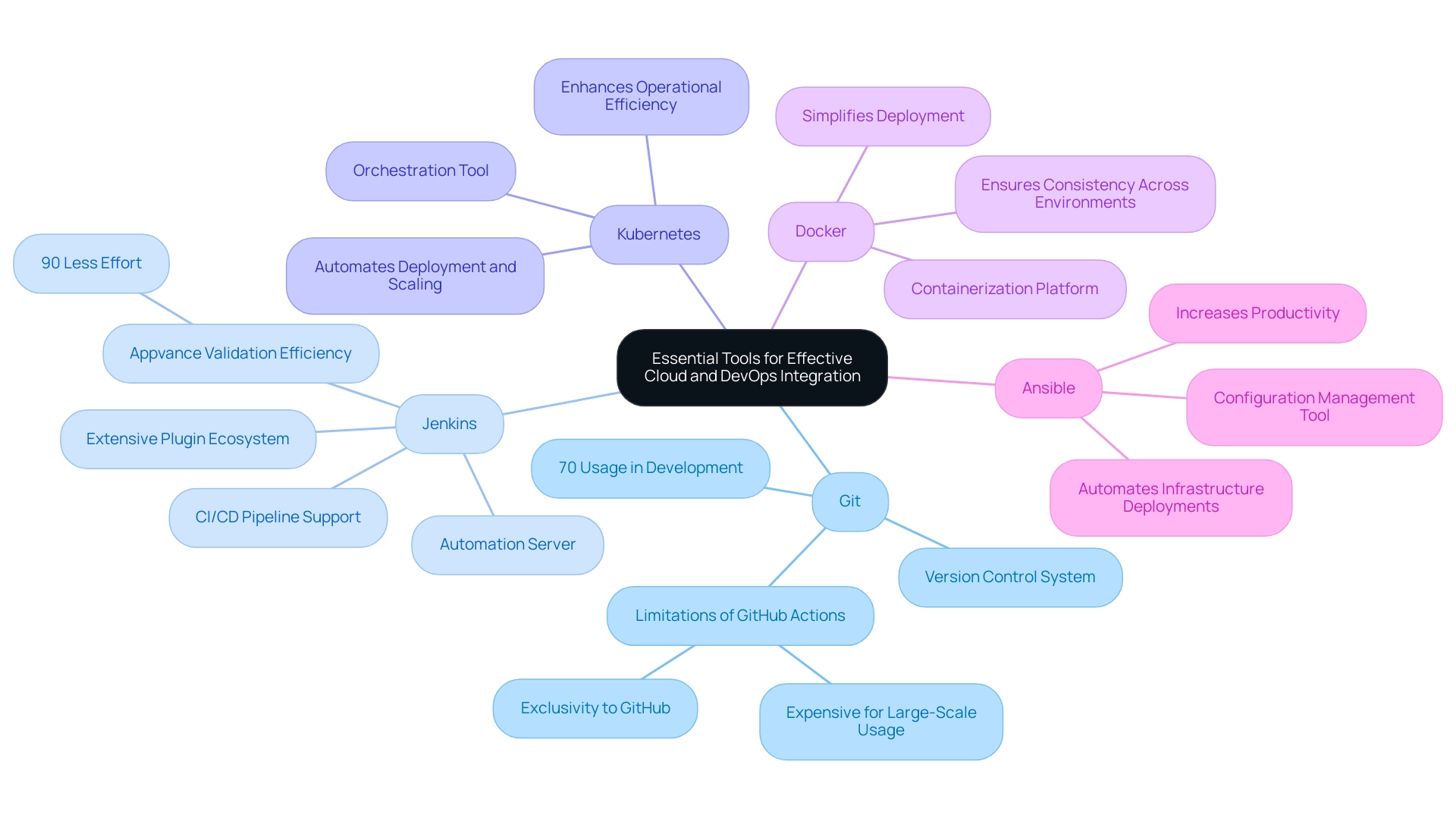
Benefits of Cloud-Based DevOps Services
Embracing cloud and DevOps services presents an array of significant benefits that can transform IT operations.
- Scalability: One of the foremost advantages is the ability to dynamically scale infrastructure and applications, which enables entities to effectively respond to fluctuating demands without incurring substantial upfront costs. This flexibility is a game-changer for businesses aiming to maintain competitive agility in a fast-paced market. Significantly, Desktop-As-A-Service is anticipated to expand from $2.06M in 2022 to $3.1M in 2024, emphasizing the rising dependence on scalable online solutions.
- Cost Efficiency: Organizations can leverage pay-as-you-go models to optimize technology expenditures, significantly lowering costs related to the upkeep of on-premises infrastructure. For instance, companies utilizing cloud resources have reported remarkable savings; CloudZero's insights helped organizations like Drift achieve annual AWS cost reductions of $2.4 million.
- Improved Collaboration: Cloud tools significantly enhance cooperation among distributed groups, facilitating real-time communication and effective project management that transcends geographical boundaries. This is crucial in an era where remote work is prevalent and groups are often spread across multiple locations. DevOps fosters collaboration among these teams, ultimately accelerating delivery and improving product quality.
- Faster Time to Market: The incorporation of automation with online resources speeds up development and deployment cycles, allowing enterprises to quickly adjust to market shifts. This agility is critical in ensuring that businesses can deliver products and services in a timely manner, keeping pace with customer expectations.
- Enhanced Security: Cloud providers invest heavily in robust security measures, equipping organizations with advanced data protection and compliance capabilities. With 72% of respondents reporting unified security and observability to counteract dynamic security threats, the security robustness of online platforms cannot be overstated. As DORA states, "the primary deployment target for development operations teams is containers," further highlighting the significance of utilizing contemporary online solutions.
In summary, the strategic adoption of cloud and DevOps services in 2024 not only supports scalability and cost efficiency but also fosters improved collaboration, rapid deployment, and enhanced security, making it an essential consideration for forward-thinking organizations.
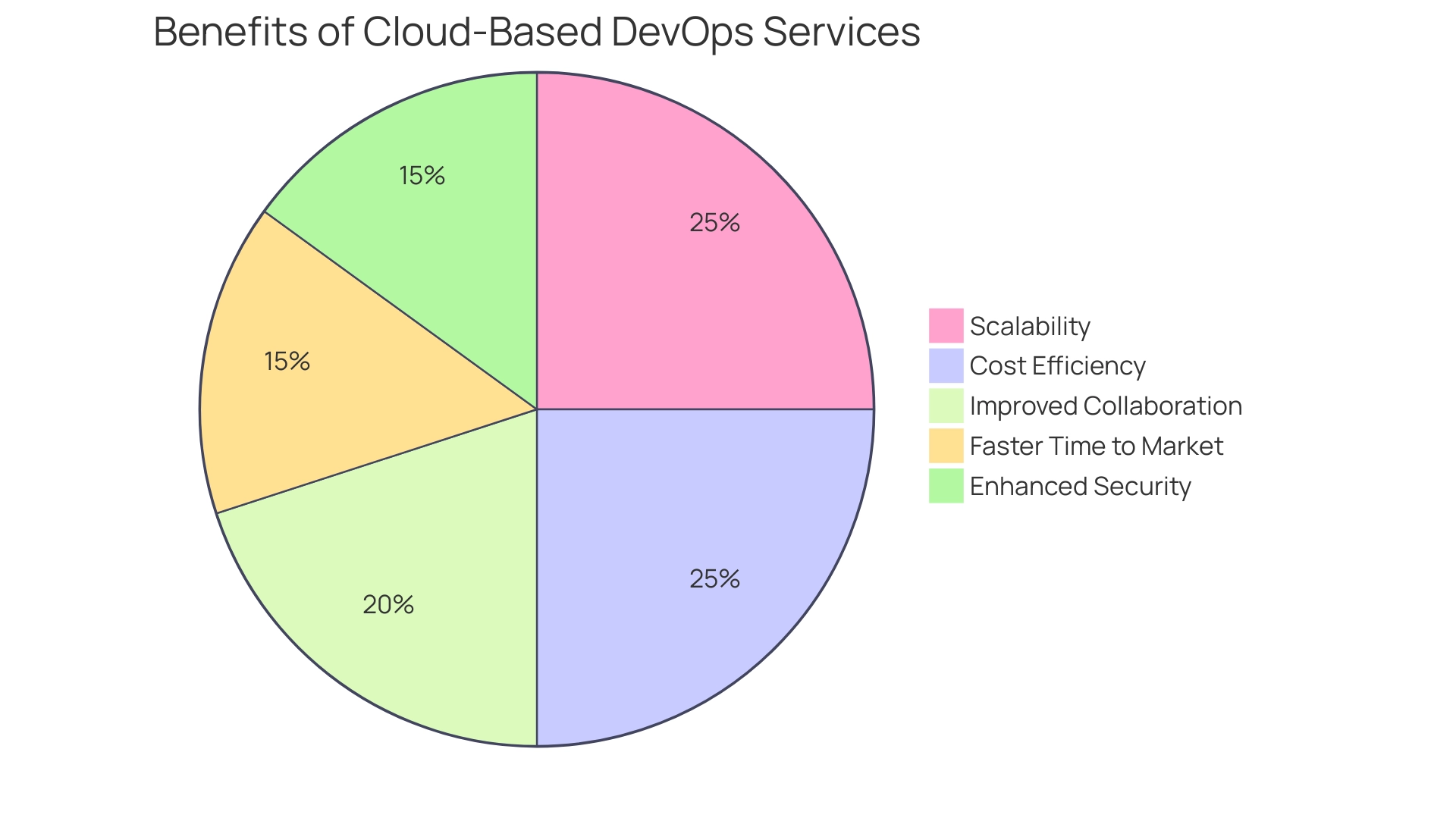
Challenges in Implementing Cloud and DevOps Solutions
Organizations aiming to adopt cloud and DevOps services frequently encounter numerous substantial obstacles that need to be addressed for a successful transition.
-
Cultural Resistance: Transitioning to a collaborative mindset often encounters opposition from groups rooted in conventional workflows. This cultural inertia can hinder progress.
Organizations should prioritize change management initiatives and offer comprehensive training programs to facilitate a smoother transition. Recent reports indicate that entities with strong DevOps cultures have experienced a 20% reduction in employee turnover, underscoring the importance of promoting collaboration and dismantling silos. -
Skill Gaps: The rapid technological advancements in cloud and DevOps services often result in skill gaps among team members. To bridge these gaps effectively, organizations must invest in ongoing training and consider hiring specialized talent. This proactive approach ensures teams are equipped with the necessary skills to leverage modern tools effectively. For instance, the continuous integration tools market, valued at $1.4 billion, emphasizes the need for familiarity with tools like Jenkins, which leads the market with a 46.35% share.
-
Integration Complexity: Integrating existing systems with new technologies and cloud and DevOps services can pose significant challenges. Conducting thorough assessments of current infrastructures and utilizing advanced integration platforms can help mitigate these complexities, ensuring a more seamless transition. The anticipated increase of Desktop-As-A-Service from $2.06M in 2022 to $3.1M in 2024 further highlights the necessity for effective integration strategies as organizations transition to online solutions.
-
Security Concerns: Moving to digital environments raises pertinent security concerns. Organizations must implement robust security measures, including encryption protocols and stringent access controls, to safeguard sensitive data effectively.
-
Cost Management: While cloud services often promise cost efficiency, unexpected expenses can arise if usage is not closely monitored. Organizations should establish rigorous budget controls and continuously assess usage patterns to manage costs effectively and prevent budget overruns.
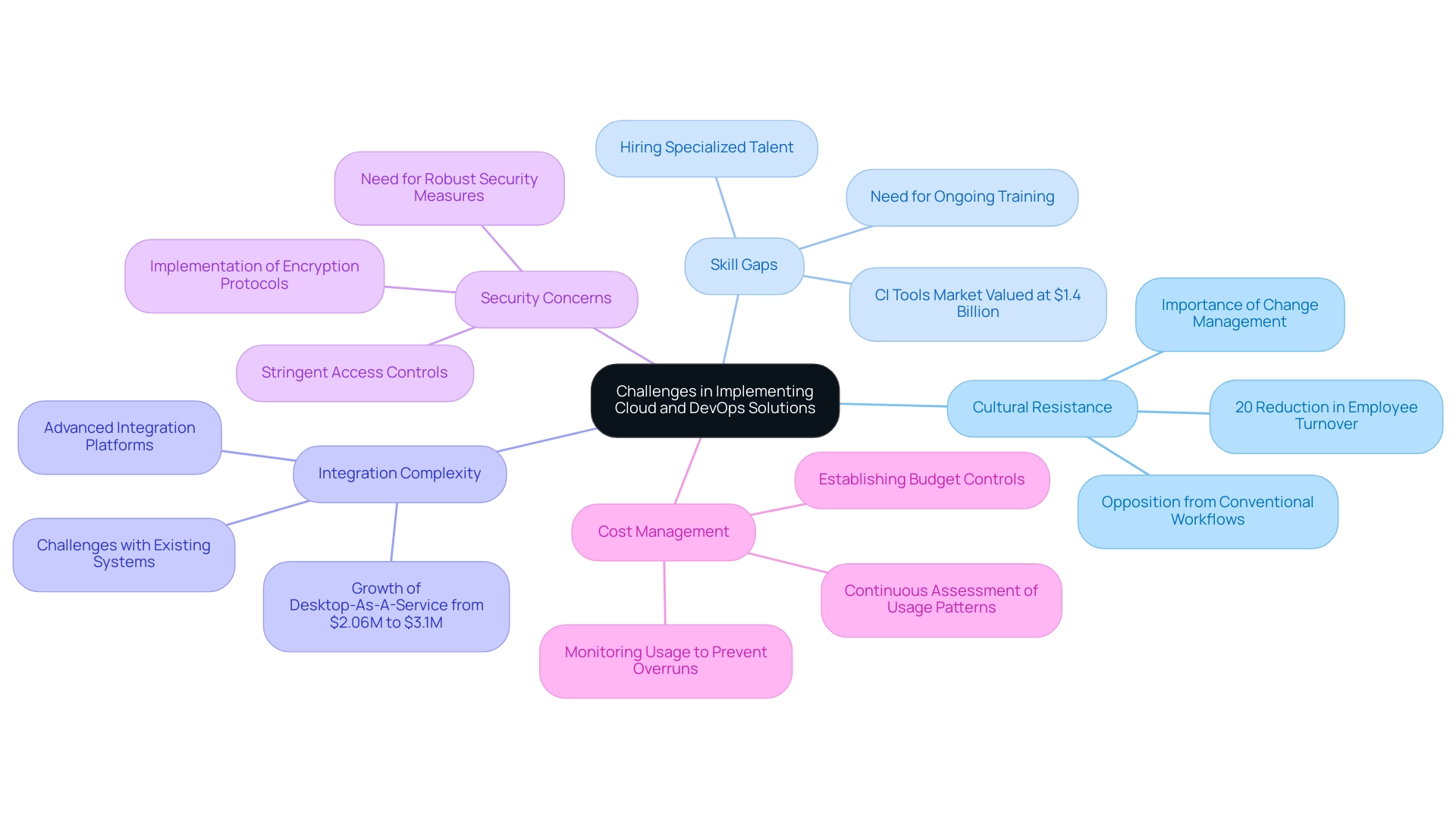
Conclusion
The integration of DevOps practices with cloud solutions has proven to be a transformative approach for organizations seeking enhanced efficiency and agility. By emphasizing collaboration, automation, and continuous feedback, businesses can significantly improve their deployment frequency and product quality. Key practices such as Continuous Integration and Delivery (CI/CD) and Infrastructure as Code (IaC) have emerged as essential components in optimizing cloud and DevOps performance, enabling teams to work more effectively and respond swiftly to market demands.
While the journey towards successful implementation of these practices is fraught with challenges, including cultural resistance and skill gaps, organizations that strategically adopt cloud-based DevOps services are well-positioned to overcome these obstacles. The benefits of scalability, cost efficiency, improved collaboration, faster time to market, and enhanced security underscore the critical role that modern cloud solutions play in today’s competitive landscape.
As organizations continue to embrace these practices, it is clear that the adoption of cloud-based DevOps is not merely a trend but a necessary evolution in IT operations. By prioritizing the integration of these methodologies, businesses can not only streamline their processes but also secure a competitive edge in an increasingly dynamic environment. The commitment to fostering a DevOps culture, alongside the effective use of essential tools, will ultimately pave the way for sustained success and innovation in the digital age.




